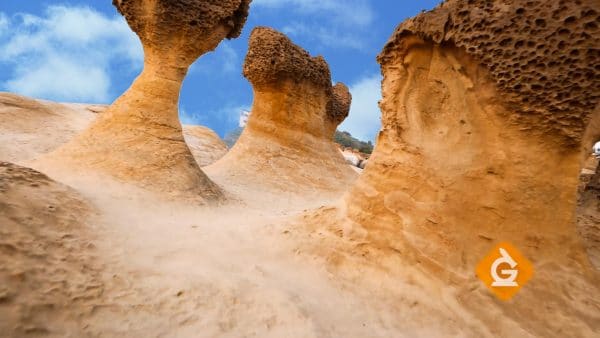Weathering Definition
Weathering breaks down Earth's surface into smaller pieces. For example, water can wear away rocks.
View Lesson on Weathering & Erosion
Become a member to get full access to our entire library of learning videos, reading material, quiz games, simple DIY activities & more.
Become a member to get full access to our entire library of learning videos, quiz games, & more.
Plans & Pricingto watch this full video.

Access All Videos
and Lessons, No Limits.
Access All Videos

No credit card required,
takes 7 sec to signup.
No card required

Ready-to-go lessons
that save you time.
Ready-to-go lessons
If you are on a school computer or network, ask your tech person to whitelist these URLs:
*.wistia.com, fast.wistia.com, fast.wistia.net, embedwistia-a.akamaihd.net
Sometimes a simple refresh solves this issue. If you need further help, contact us.
Weathering & Erosion
Fun Facts
- For as long as the Earth has existed, weathering has helped shape the landscape.
- Over long periods of time, weathering from wind can create amazing landscapes, such as rocks that look like mushrooms.
- Plant roots can wedge into cracks, eventually breaking off rock pieces.
Why Do We Need To Know About Weathering
Learning about how rocks and soil break down (weathering) helps us understand how the Earth changes. This is really important for many jobs. For example, people who build roads or keep them in good shape need to know about weathering to fix problems like potholes that happen because of ice. This shows why knowing about weathering is key to taking care of our roads and buildings.
Knowing about weathering and erosion is also important for jobs in environmental science, farming, tourism related to nature, and managing parks. It helps these professionals stop the land from getting ruined, take care of natural places, and keep people safe from things like mudslides. This knowledge is used for protecting the environment, designing landscapes, and studying rocks.
Frequently Asked Questions
Check out the Full Lesson on Weathering & Erosion
In this lesson, we learn that:
- The Earth’s surface gets broken down through weathering.
- Small pieces of the Earth get moved through erosion.
- The small pieces are deposited somewhere else through a process called deposition.
Related Topics
- Absorbency Definition
- Atom Definition
- Chemical Reaction Definition
- Chloroplast Definition
- Definition Of Evidence
- Distillation Definition
- Divergent Boundary Definition
- Earth’s Rotation Definition
- Electric Field Definition
- Endoskeleton Definition
- Erosion Definition
- Evaporation Definition
- Exoskeleton Definition
- Generator Definition
- Geologic Processes Definition
- Groundwater Definition
- Habitat Definition
- Humidity Definition
- Hydrosphere Definition
- Igneous Rock Definition
- Inclined Plane Definition
- Keystone Species Definition
- Kuiper Belt Definition
- Magnetic Field Definition
- Magnetism Definition
- Marsupial Definition
- Melting Definition
- Molecule Definition
- Newton’s 2nd Law Of Motion Definition
- Nucleus Definition
- Ocean Current Definition
- Organ Definition
- Pattern Definition
- Pendulum Definition
- Potential Energy Definition
- Precipitation Definition
- Property Definition
- Pulley Definition
- Recycle Definition
- Reflecting Surface Definition
- Reversible Change Definition
- Season Definition
- Seed Dispersal Definition
- Seeing Definition
- Soil Definition
- Solar System Definition
- Wavelength Definition
- Weathering Definition
Start a Free Trial Today. Get a $5 Amazon Gift Card!
Teachers! Start a free trial & we'll send your gift card within 1 day. Only cards left. Try it now.
Select Grade
Select Subject
This email is associated with a Science Kit subscription. Kit subscriptions are managed on this separate page: Manage Subscription

-
Download InvoiceScience & Math$/yr
-
Download InvoiceScience Only$/yr

access all lessons
• No credit card required •
"My students loved the videos. I started the video subscription in May and used them as a review before the state test, which I know contributed to 100% of my class passing the state test."
Rhonda Fox 4th Grade Teacher, Ocala, Florida
• No credit card required •
"My students loved the videos. I started the video subscription in May and used them as a review before the state test, which I know contributed to 100% of my class passing the state test."
Rhonda Fox 4th Grade Teacher, Ocala, Florida
• No credit card required •
Already a member? Sign In
* no credit card required *

* no credit card required *
* no credit card required *


no credit card required
Skip, I will use a 3 day free trial
Enjoy your free 30 days trial
-
Unlimited access to our full library
of videos & lessons for grades K-5. -
You won’t be billed unless you keep your
account open past your 14-day free trial. -
You can cancel anytime in 1 click on the
manage account page or by emailing us.
-
Unlimited access to our full library of videos & lessons for grades K-5.
-
You won't be billed unless you keep your account open past 14 days.
-
You can cancel anytime in 1-click on the manage account page.
Cancel anytime in 1-click on the manage account page before the trial ends and you won't be charged.
Otherwise you will pay just $10 CAD/month for the service as long as your account is open.
Cancel anytime on the manage account page in 1-click and you won't be charged.
Otherwise you will pay $10 CAD/month for the service as long as your account is open.
We just sent you a confirmation email. Enjoy!
DoneWe use cookies to make your experience with this site better. By using this site you agree to our use of cookies. Click "Decline" to delete and block any non-essential cookies for this site on this specific property, device, and browser. Please read our privacy policy for more information on the cookies we use.Learn More
We use cookies to improve your experience. By using this site, you agree to our use of cookies. Click "Decline" to block non-essential cookies. See our privacy policy for details.Learn More



























































































































